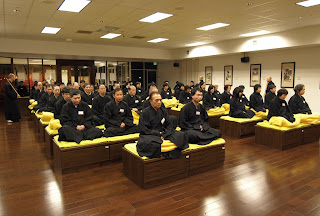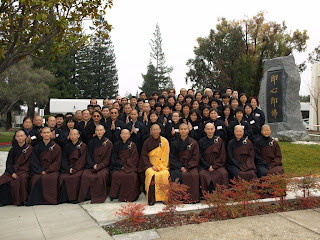Some of the poems Ven. Jianhu mentioned in the Zen-7 Retreat:
見盧山瀑布題詩
穿雲透石不辭勞,遠地方知出處高
溪澗豈能留得住,終歸大海作波濤
--香雲智閑 & 唐宣宗
On Seeing the Waterfall at Mt. Lu
Penetrating the clouds and the rocks, you are not detered by the hardships
Haveing gone this far, you must come from a high place.
How can the rivers and streams contain me?
My place in to roam free in the great ocean.
--Master Xianyun & Emperor Tang Xuan Zong
塵勞迥脫事非常,緊把繩頭做一場。
不是一番寒徹骨,爭得梅花撲鼻香。
--黃檗禪師
Chill to the Bone
To be completely free from the burden of defilements
Is no ordinary undertaking;
Grab the rope firmly with all your might!
Only through the bone-biting chill of winter,
Will the plum blossoms
Smack you with their delightful fragrance.
--Master Huang Bo
學道之人不識真,祇為從來認識神。
無始劫來生死本,癡人喚作本來人。
--長沙景岑禪師
The cultivators never recognized what is real,
Because they always think of consciousness as the soul,
Which is the root of samsara since beginningless time;
They mistake the dummy as the original.
--Master Chang Sha
但自無心於萬物,何妨萬物時圍繞
--龐蘊居士
If the mind does not cling to anything,
It doesn’t matter if you’re surrounded by everything.
--Layman Pang Yun









